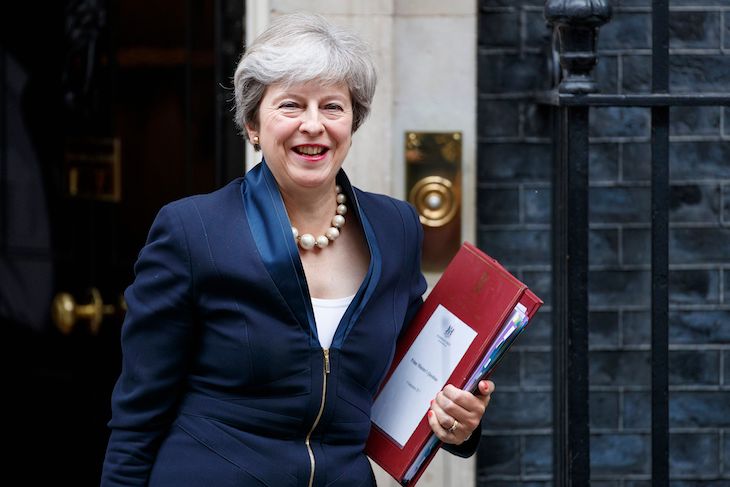Nearly all Tory MPs now agree Theresa May should stay on as Prime Minister. She must get the party through Brexit, they say. A leadership contest now would risk splitting the party over the European issue. One senior Tory who was agitating to depose May back in July has told me that he has now decided it would be best if she stays until 2019.
But this desire to keep her in place for Brexit should not be confused (especially not by Mrs May) with a desire to see her fight the next election. The number of Tories prepared to even contemplate following her into another battle remains vanishingly small. Memories of her performance in the general election are far too vivid, and painful, for that.
So if Brexit is her main job, how is it going? The negotiations have certainly hit an impasse — but they were always going to at this stage. All EU states have an interest in getting as much money out of Britain as possible, while no British government would want to agree an exit bill without some guarantees on the nature of the future relationship. This means that the current game of diplomatic chicken was inevitable.
There has been a disappointing lack of British ideas in areas other than the so-called ‘divorce bill’. The government’s various position papers were fine, as far as they went. But, when reading them, one can’t escape the feeling that had these documents been produced faster, negotiations might have been framed in the way that the UK wants. As one of those deeply involved in the Brexit process admits: ‘All these things could have been said last year’. Even cabinet ministers admit, privately, that the papers are strikingly thin.
Mrs May’s biggest problem is that she can no longer credibly say that ‘no deal is better than a bad deal’. Had she won a commanding majority in the general election, the EU would have been acutely aware that she could have given up on talks whenever she wanted. A House of Commons with a reasonable Tory majority would have been prepared to pass both sweeping business tax cuts and a regulatory overhaul. But a hung parliament would not. Philip Hammond, who first raised this idea in the German press in January, took to the French press this summer to dismiss it.
The question now is whether she can still negotiate a good deal without this leverage. She must not, for example, be drawn into signing any agreement promising that Britain will not compete with the EU by lowering tax and regulations. Many in officialdom would be happy with an EEA-minus arrangement, which would involve Britain shadowing the EU’s regulatory framework. May must resist this idea.
Another consequence of her botched election is that Labour feels emboldened and now plans to vote against the withdrawal bill which aims to take current EU regulations into British law. This significantly increases the chances of a chaotic Brexit. If Labour opposes this Bill in the Commons, it will also, surely, do so in the Lords, where the government has no kind of majority. If the bill is defeated, or amended in the Lords, there will be little time to get it through via the Parliament Act before we leave the EU in March 2019.
May is now talking about her government having a purpose beyond Brexit; namely the reform agenda that she set out when she first entered No. 10. Dealing with these ‘burning injustices’ is what she wants to be remembered for. Gavin Barwell, the former Tory minister who is now her chief of staff, also thinks this is the right approach. He has told cabinet ministers that this agenda resonates with the public.
Most Tories think May’s duty, other than seeing Brexit through, is to prepare the party for the leadership contest that will follow her departure. The summer break has driven home to MPs how keen the membership is on a generational changing of the guard. I am told of constituency association chairmen who have made clear that they aren’t interested in having any of the current cabinet to speak, and would rather see new talent instead.
But this new talent needs a chance to prove itself. So ministers of state who are expected to run for the leadership, such as Dominic Raab and Rory Stewart, should be elevated to the cabinet. May should also be prepared to promote the most promising members of the 2015 intake into ministerial jobs.
We can expect the media interest to concentrate on what happens to Jacob Rees-Mogg, the current darling of the grassroots. The structure of the Tory leadership contest, with MPs narrowing the field down to two before the members get a say, means that he is unlikely to become the most surprising winner of a leadership contest since Jeremy Corbyn. But it is worth reflecting on the source of this Moggmania. It comes not just from an admiration of his verbal dexterity and clarity of argument. It also stems from a frustration that after seven years of Tory-led government, the books won’t be balanced until the middle of the next decade.
Mrs May’s position is by no means secure: the plan to keep her in place until Brexit is done could be blown off course by events. But she goes into next month’s Tory conference in a far stronger position than expected.
Got something to add? Join the discussion and comment below.
Get 10 issues for just $10
Subscribe to The Spectator Australia today for the next 10 magazine issues, plus full online access, for just $10.
You might disagree with half of it, but you’ll enjoy reading all of it. Try your first month for free, then just $2 a week for the remainder of your first year.















Comments
Don't miss out
Join the conversation with other Spectator Australia readers. Subscribe to leave a comment.
SUBSCRIBEAlready a subscriber? Log in